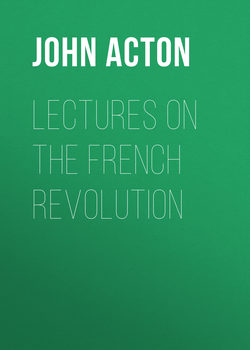Lectures on the French Revolution

Реклама. ООО «ЛитРес», ИНН: 7719571260.
Оглавление
Acton John Emerich Edward Dalberg Acton Baron. Lectures on the French Revolution
PREFATORY NOTE
I. THE HERALDS OF THE REVOLUTION
II. THE INFLUENCE OF AMERICA
III. THE SUMMONS OF THE STATES-GENERAL
IV. THE MEETING OF THE STATES-GENERAL
V. THE TENNIS-COURT OATH
VI. THE FALL OF THE BASTILLE
VII. THE FOURTH OF AUGUST
VIII. THE CONSTITUTIONAL DEBATES
IX. THE MARCH TO VERSAILLES
X. MIRABEAU
XI. SIEYÈS AND THE CONSTITUTION CIVILE
XII. THE FLIGHT TO VARENNES
XIII. THE FEUILLANTS AND THE WAR
XIV. DUMOURIEZ
XV. THE CATASTROPHE OF MONARCHY
XVI. THE EXECUTION OF THE KING
XVII. THE FALL OF THE GIRONDE
XVIII. THE REIGN OF TERROR
XIX. ROBESPIERRE
XX. LA VENDÉE
XXI. THE EUROPEAN WAR
XXII. AFTER THE TERROR
APPENDIX. THE LITERATURE OF THE REVOLUTION
Отрывок из книги
The revenue of France was near twenty millions when Lewis XVI., finding it inadequate, called upon the nation for supply. In a single lifetime it rose to far more than one hundred millions, while the national income grew still more rapidly; and this increase was wrought by a class to whom the ancient monarchy denied its best rewards, and whom it deprived of power in the country they enriched. As their industry effected change in the distribution of property, and wealth ceased to be the prerogative of a few, the excluded majority perceived that their disabilities rested on no foundation of right and justice, and were unsupported by reasons of State. They proposed that the prizes in the Government, the Army, and the Church should be given to merit among the active and necessary portion of the people, and that no privilege injurious to them should be reserved for the unprofitable minority. Being nearly an hundred to one, they deemed that they were virtually the substance of the nation, and they claimed to govern themselves with a power proportioned to their numbers. They demanded that the State should be reformed, that the ruler should be their agent, not their master.
That is the French Revolution. To see that it is not a meteor from the unknown, but the product of historic influences which, by their union were efficient to destroy, and by their division powerless to construct, we must follow for a moment the procession of ideas that went before, and bind it to the law of continuity and the operation of constant forces.
.....
Such was the spirit of that remarkable group of men, especially of Mercier de la Rivière, of whom Diderot said that he alone possessed the true and everlasting secret of the security and the happiness of empires. Turgot indeed had failed in office; but his reputation was not diminished, and the power of his name exceeded all others at the outbreak of the Revolution. His policy of employing the Crown to reform the State was at once rejected in favour of other counsels; but his influence may be traced in many acts of the Assembly, and on two very memorable occasions it was not auspicious. It was a central dogma of the party that land is the true source of wealth, or, as Asgill said, that man deals in nothing but earth. When a great part of France became national property, men were the more easily persuaded that land can serve as the basis of public credit and of unlimited assignats. According to a weighty opinion which we shall have to consider before long, the parting of the ways in the Revolution was on the day when, rejecting the example both of England and America, the French resolved to institute a single undivided legislature. It was the Pennsylvanian model and Voltaire had pronounced Pennsylvania the best government in the world. Franklin gave the sanction of an oracle to the constitution of his state, and Turgot was its vehement protagonist in Europe.
A king ruling over a level democracy, and a democracy ruling itself through the agency of a king, were long contending notions in the first Assembly. One was monarchy according to Turgot, the other was monarchy adapted to Rousseau; and the latter, for a time, prevailed. Rousseau was the citizen of a small republic, consisting of a single town, and he professed to have applied its example to the government of the world. It was Geneva, not as he saw it, but as he extracted its essential principle, and as it has since become, Geneva illustrated by the Forest Cantons and the Landesgemeinde more than by its own charters. The idea was that the grown men met in the market-place, like the peasants of Glarus under their trees, to manage their affairs, making and unmaking officials, conferring and revoking powers. They were equal, because every man had exactly the same right to defend his interest by the guarantee of his vote. The welfare of all was safe in the hands of all, for they had not the separate interests that are bred by the egotism of wealth, nor the exclusive views that come from a distorted education. All being equal in power and similar in purpose, there can be no just cause why some should move apart and break into minorities. There is an implied contract that no part shall ever be preferred to the whole, and minorities shall always obey. Clever men are not wanted for the making of laws, because clever men and their laws are at the root of all mischief. Nature is a better guide than civilisation, because nature comes from God, and His works are good; culture from man, whose works are bad in proportion as he is remoter from natural innocence, as his desires increase upon him, as he seeks more refined pleasures, and stores up more superfluity. It promotes inequality, selfishness, and the ruin of public spirit.
.....